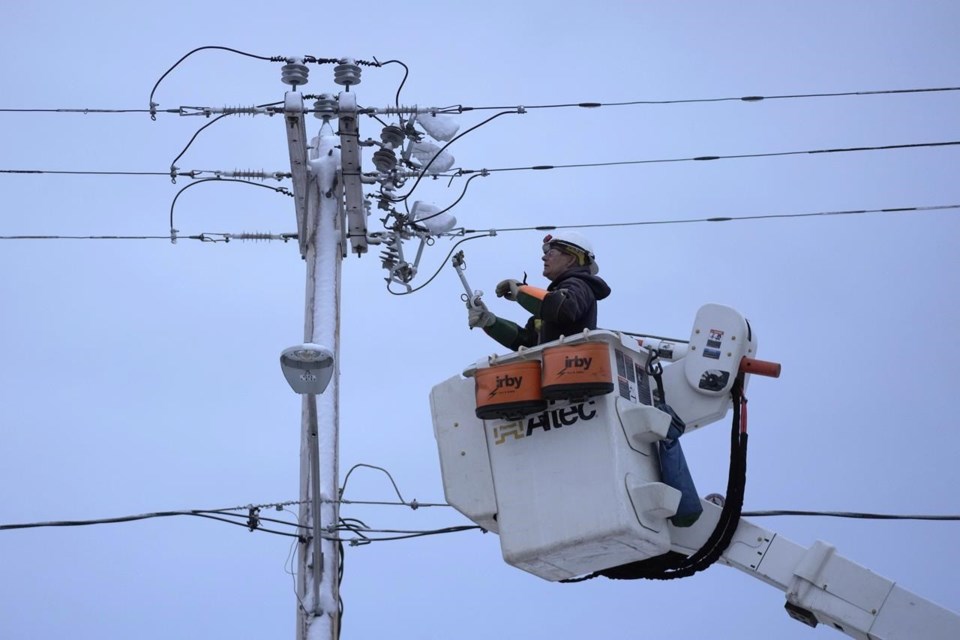PORTLAND, Maine (AP) — Maine voters turned down an attempt to oust the state’s corporate-owned electric utilities among several ballot initiatives Tuesday, and approved one to stop foreign spending in referendums.
Voters also decided to restore language about honoring obligations to Native American tribes to printed versions of the state constitution. Polls closed at 8 p.m. on an Election Day that saw consistent participation despite a lack of statewide offices on the ballot.
The Maine Department of the Secretary of State saw “steady turnout at the locations we’ve visited, maybe even strong for an odd-year election,” said Emily Cook, a spokesperson for the office.
The state’s busy slate of referendums came a year before Maine will likely once again emerge as a battleground for a congressional seat and a presidential electoral vote in its more conservative 2nd Congressional District.
NEW POWER COMPANY
Maine voters rejected the proposed takeover of two investor-owned utilities that distribute 97% of electricity in the state.
Voters opted for the status quo over a referendum that would have marked the first time a state with existing private utilities discarded them all at the same time. The proposal called for dismantling Central Maine Power and Versant Power and creating a nonprofit utility called Pine Tree Power to govern the grid.
Supporters said there was little to lose because of the utilities’ poor performance. Critics said there’s no guarantee the nonprofit utility would perform any better, while the move could spark lawsuits and buying out the existing utilities could cost billions — as much as $13.5 billion.
Willy Ritch, executive director of the Maine Affordable Energy Coalition, which opposed the takeover, said Maine voters “rejected billions of dollars in debt and they rejected the risk and uncertainty that came with it.”
The vote came amid intense criticism of Central Maine Power over its slow response to storm-related power outages, a botched billing system rollout and perceived roadblocks to connecting renewable power projects to the grid, among other things.
“Our grassroots campaign has talked with thousands of Mainers — it is clear that CMP and Versant are hurting people,” said Al Cleveland, Pine Tree Power's campaign manager, who also said the drive for a consumer-owned utility would continue.
FOREIGN ELECTION INFLUENCE
Mainers voted to stop foreign government spending in local referendums, closing a loophole in federal election law that a Canadian utility giant exploited to protect its ventures in the state.
The Canadian-government-owned Hydro Quebec spent millions in a failed attempt to stop a proposal to halt a cross-border hydropower transmission project in which the utility stood to earn $10 billion.
Federal election law prevents foreign governments and entities from spending money to influence candidate elections, yet there’s no such ban covering state referendums.
Republican state Sen. Rick Bennett, who led the campaign to put the proposal on the ballot, praised voters for taking a common sense step toward “getting control” of money in politics.
“It’s one of the greatest scourges in politics,” Bennett said Tuesday evening. “We have to deal with that before we can deal with the other host of issues.”
With the approval, Maine becomes the 10th state to ban foreign spending in state ballot initiatives, said Aaron McKean, legal counsel for the nonprofit, nonpartisan Campaign Legal Center in Washington, D.C.
CONSTITUTION AND TRIBES
Voters decided to restore long-removed language about Maine’s obligations to Native American tribes to the printed versions of its constitution.
Maine inherited the treaties from Massachusetts when it became its own state more than 200 years ago. The language still applies, but it was removed from the printed constitution in the 19th century.
Members of Maine’s Native American tribes and others have said the restoration of the language to the printed constitution would make clear the state’s obligations to Indigenous groups. Democratic Gov. Janet Mills had opposed the measure, though, and has said she feared it could lead to lawsuits.
Maulian Bryant, Penobscot Nation ambassador and president of the Wabanaki Alliance, said that restoring the tribal treaties to the printed constitutions honors the tribes’ ancestors.
“It feels good that Mainers heard us and felt our message and agreed,” she said.
RIGHT TO REPAIR
Mainers approved a “right to repair” initiative designed to allow vehicle owners and independent repair shops access to on-board diagnostic systems in vehicles.
Massachusetts voters approved a right to repair proposal of their own in 2020. That proposal provided vehicle owners and independent repair shops with more access to mechanical data related to maintenance and repairs.
OUT-OF-STATE PETITIONERS
Maine voters rejected a proposed amendment to the state constitution to take out provisions that require circulators of citizen’s initiatives to be residents of the state.
But the requirement already was found unconstitutional in federal court. Approval of Tuesday’s ballot question would have aligned the state with federal court rulings.
Patrick Whittle And David Sharp, The Associated Press



